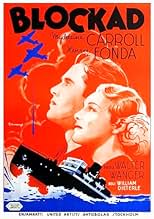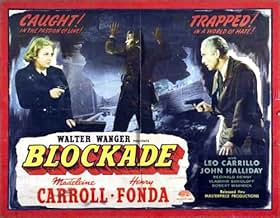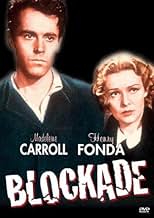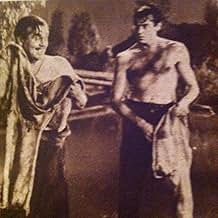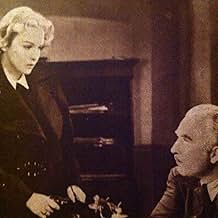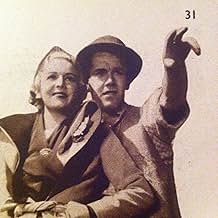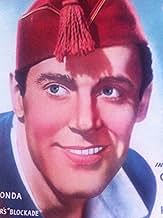Un simple paysan est contraint de prendre les armes pour défendre sa ferme pendant la guerre civile espagnole. En chemin, il tombe amoureux d'un Russe dont le père est impliqué dans l'espion... Tout lireUn simple paysan est contraint de prendre les armes pour défendre sa ferme pendant la guerre civile espagnole. En chemin, il tombe amoureux d'un Russe dont le père est impliqué dans l'espionnage.Un simple paysan est contraint de prendre les armes pour défendre sa ferme pendant la guerre civile espagnole. En chemin, il tombe amoureux d'un Russe dont le père est impliqué dans l'espionnage.
- Réalisation
- Scénario
- Casting principal
- Nommé pour 2 Oscars
- 3 victoires et 2 nominations au total
- Pietro
- (as Fred Kohler Sr.)
- Commandant
- (as Wm. B. Davidson)
- Cabaret Singer
- (as George Byron)
- Townswoman
- (non crédité)
Avis à la une
The story concerns the Spanish Civil War.
The script was written by an avowed Communist, John Howard Lawson who wanted to "present the Communist position" in his scripts. He doesn't really get to do that in Blockade, since it's deliberately ambiguous as to the different factions, referred to as "they" and "us." The costuming also doesn't suggest anything as far as sides.
The story concerns a place called Castelmare, where Marco and Luis (Fonda and Leo Carrillo) help a Russian woman, Norma (Madeleine Carroll) who has had a car accident on the way to her father's. For Marco, it's love at first sight.
When war begins, Marco is the head of a group of peasant attempting to defend Castelmare. Meanwhile, Norma and her father are forced to spy for the other side. Marco winds up killing Norma's father.
Castelmare cannot get any supplies, and Norma is being blackmailed to give information about the ship so that it can be sunk.
Probably the most striking thing are the closeups of the suffering peasants.
Casablanca it isn't. Fonda and Carroll have no chemistry. The dialogue is very stilted.
Henry Fonda at the end gives an impassioned speech right into the camera. It's embarrassing.
For political propaganda that both entertains and persuades, let me suggest Casablanca. For political propaganda that offers only a few glimpses of the radiant Madeleine Carroll and nothing more, I recommend Blockade. That, unfortunately, is not enough to salvage this less than scintillating 1930s leftist pap.
Politically,the film remains vague,always referring to the enemy as "they" like in Borzage 's 'three comrades" (but that was a great film though).The war was over on the first of March 1939;thus the film ,made in 1938,warns us ,in a clumsy way,that it's only the beginning:propaganda movies can be great,but it takes a strong screenplay (best example:"the mortal storm" Frank Borzage) and not a cat and mouse play between spies ,corrupt officers and profiteers of war.
In consequence ,the best scenes ,IMHO,are those which deal with the masses;the starving faces ,watching the ship sinking down are reminiscent of Eisenstein,whose influence was huge at the time.
The factions are referred to only as "Them" (invaders) and "Us" (invaded). The casus belli is no more than Their attempt to purloin Our land, a valley near Granada. What ensues is personalised, studio-bound melodrama. Heroic amateur soldier Henry Fonda stiffens his fellow peasants' backs to resist the grab. He woos blonde White Russian adventuress Madeleine Carroll and finally demands foreign intervention in a Chaplinesque harangue to camera: "Where's the conscience of the world?"
It all savours of Hays Office intervention and the anxiety of Lawson's "progressive" producer, Walter Wanger, not to provoke the US public by charging them for a liberal sermon. But "Blockade" may be subtler agitprop than it seems.
By 1938 anybody who read a paper or watched "The March of Time" would infer that Fonda stands for the Republic fending off General Franco's Nazi- and Fascist-backed Nationalists-- not the other way round. And Lawson's emphasis on small farmers guarding their ancestral acreage is just what Stalin ordered. In reality the country round Granada was a hotbed of anarchist schemes for collectivising agriculture, but the Communist line was that the Republic's left-front government, including democratic socialists and liberals, must be sustained till the rebel generals were routed. Only then could land reform be considered; reform under the aegis of a Communist-dominated regime subservient to Moscow, which would nationalise the land, not parcel it out to dubious anarchic types.
Moreover, Lawson must have relished making Carroll's character an exiled daughter of Russia with a crooked anti-Red father, who sees the light in Fonda's arms.
We laugh at movies such as this and "Last Train from Madrid" for their superficial, sentimental view of a burning issue. But what right has today's supposedly more liberated Hollwood to laugh? Where were Vietnam films during the conflict, apart from John Wayne's "Green Berets"? How many Gulf War or Enduring Freedom stories have we seen? How many portrayals of radical Islam, pro or anti? Hollywood is more gutlessly evasive than ever during our dangerous times. Well, export markets provide more of its profit margin than 60 years ago...
Boasting the tagline 'the most important film of 1938' and having been awarded Oscars at the time of its release, I decided to watch this film and see what the fuss was about. What I found was a film that is too self-consciously cautious to be great fun, too worthy to be involving and ends up being rather dull and uninteresting. The basic plot is set around the Spanish civil war but it appears to have been careful about coming down on either side of the argument and therefore is so balanced that it almost cancels out any content that may have been challenging or informative. This leaves a story about personalities and the central romance, which is a problem because the film doesn't deal with these very well either. The romance tries to be bleak and supposedly doomed but it just can't get the tone right and it never really gets anywhere near as emotive as it needed to be certainly this is no Casablanca.
With the script problems and rather drab direction, the film only occasionally gets close to being really impacting and involving and it was only the moments where the horrors of the conflict are allowed to get above political neutrality that the film comes to life but these are too infrequent. The cast are set adrift and do the best they can to squeeze emotion and drama out of the script but their efforts just seem out of place against a rather flat backdrop. Fonda is always watchable even if his 'good honest man' is a rather dull character and, for that reason, hard to get behind; certainly modern audiences may find his unquestioning patriotism and simple morals hard to swallow. Carroll is better than the film deserves, her performance is very good and it is just a shame that the rest of the film doesn't come up to her level of work. Support is OK but the script doesn't fill the film that well and most of the cast are given little to do.
Overall this may well have been the 'most important film of 1938' but it doesn't do a great deal today. The film doesn't inform and isn't interesting as it carefully treads the complexities of the conflict and Fonda's final to-camera rant about peace is too little, too late and just comes across as being rather pat. The romance could have saved it but this too is fluffed despite the best efforts of Carroll, but Fonda, despite being worth a look, plays it all to simplistically in line with the material.
Le saviez-vous
- AnecdotesThe original title of this film was "The River is Blue" and the director was to be Lewis Milestone. Kurt Weill even wrote music for the project that was never used (lyrics by Ann Ronell). The title was changed to "The Rising Tide" and "Castles in Spain," then finally to "Blockade." The topic of the Spanish Civil War was politically sensitive and there is some hint that the upheavals of the original project were due to the political content of the film.
- Citations
Marco: [last lines, after being told to find peace] Marco: Peace? Where can you find it? Our country's been turned into a battlefield! There's no safety for old people and children. Women can't keep their families safe in their houses; they can't be safe in their own fields! Churches, schools, hospitals are targets! It's not war; war is between soldiers! It's murder! Murder of innocent people! There's no sense to it. The world can stop it! Where's the conscience of the world?
- ConnexionsFeatured in Red Hollywood (1996)
Meilleurs choix
Détails
Box-office
- Budget
- 692 087 $US (estimé)
- Durée1 heure 25 minutes
- Couleur
- Rapport de forme
- 1.37 : 1
Contribuer à cette page


